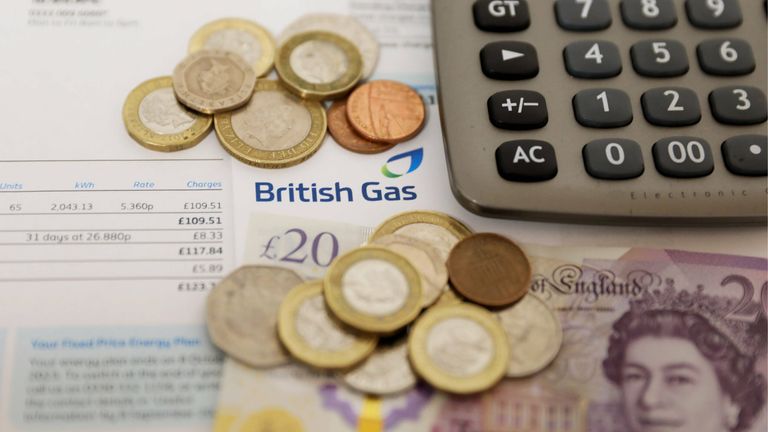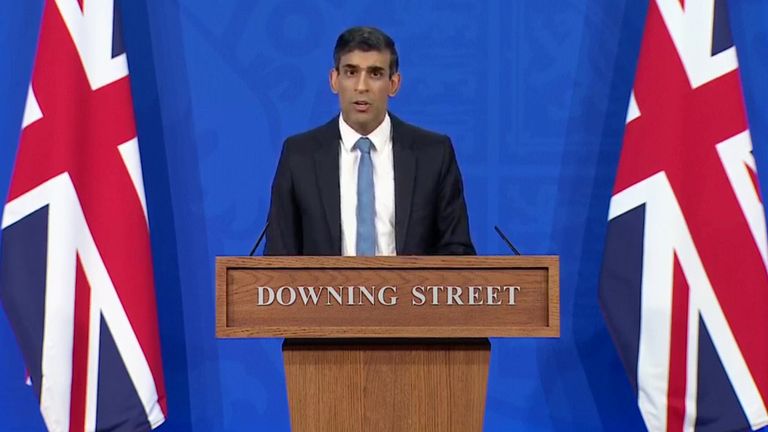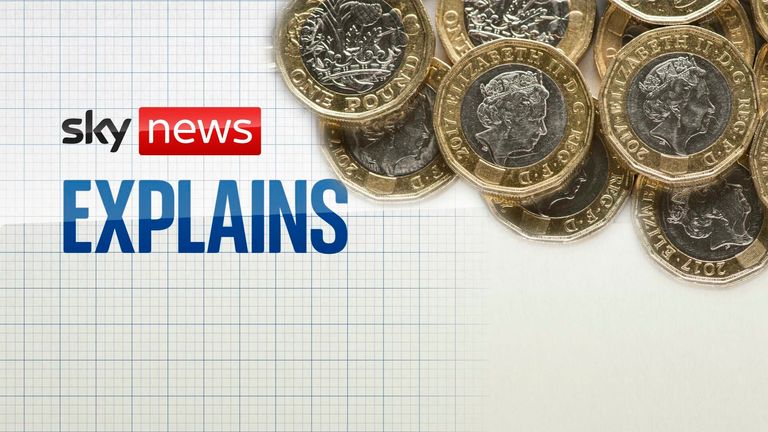Millions of households will see their energy bills rise to a typical £1,971 a year - prompting Rishi Sunak to announce a £350 package of help.
The 54% increase announced by regulator Ofgem, which will on average see bills for customers paying by direct debit with default variable gas and electricity tariffs rise by £693, will take effect in April and follows a 12% rise in October.
Those using prepayment meters - around 4.5 million customers - will see a typical increase of £708 to £2,017.
Measures revealed to help with rising cost of living - live updates
In all, 22 million households are covered by the hikes.
Immediately after the announcement, the chancellor responded by announcing a plan to ease the pressure on households with £350 of support including £200 off energy bills from October - to be repaid over five years from next year - and a £150 council tax discount for households but only those within the A to D bands.
Speaking at a Downing Street news conference on Thursday evening, Mr Sunak said the "significant amount of money" would "make a big difference to the vast majority of households".
The chancellor expressed his hope that Britons would be "reassured" by the government action to help "ease the adjustment" to rising energy prices but said he "doesn't have a crystal ball" and warned households they will have to adjust to higher prices in the future.
However, despite growing calls for him to scrap a planned rise to National Insurance, Mr Sunak confirmed the tax hike will go ahead in April in order to boost funds to help the NHS recover from the COVID pandemic.
But the chancellor added his "mission" was to cut taxes ahead of the next general election, scheduled for May 2024.
Prime Minister Boris Johnson had earlier acknowledged there was a "real cost of living crunch" but said the "mega package" unveiled by the chancellor would help.
Yet just an hour after the price cap announcement, the Bank of England said it would raise interest rates, adding further pain for many households, as the Bank acknowledged families were facing the biggest fall in living standards for three decades.
Surging wholesale gas prices - currently about four times higher than at the same time last year - have driven the energy price cap increase.
It also includes a £68 charge to cover the cost of protecting millions of customers whose energy suppliers have collapsed in recent months.
Ofgem said it would tomorrow announce new measures "to help the energy market weather future volatility" including enabling the regulator to adjust the price cap more frequently than every six months "in exceptional circumstances" to ensure that it "still reflects the true cost of supplying energy".
The price cap hike adds to a cost of living squeeze for households who are also facing higher shop prices, an increase in national insurance, and rising interest rates.
Subscribe to the Daily podcast on Apple Podcasts, Google Podcasts, Spotify, Spreaker
Analysts think it could go up even more in the autumn when Ofgem reviews the cap again.
Among those affected by the latest price cap hike will be former customers of the 29 energy suppliers that have collapsed in the wake of the wholesale gas price surge, affecting a total 4.3 million domestic users.
Ofgem chief executive Jonathan Brearley said: "We know this rise will be extremely worrying for many people, especially those who are struggling to make ends meet, and Ofgem will ensure energy companies support their customers in any way they can.
"The energy market has faced a huge challenge due to the unprecedented increase in global gas prices, a once in a 30-year event, and Ofgem's role as energy regulator is to ensure that, under the price cap, energy companies can only charge a fair price based on the true cost of supplying electricity and gas.
"Ofgem is working to stabilise the market and over the longer term to diversify our sources of energy which will help protect customers from similar price shocks in the future."
https://news.google.com/__i/rss/rd/articles/CBMiamh0dHBzOi8vbmV3cy5za3kuY29tL3N0b3J5L2Nvc3Qtb2YtbGl2aW5nLW1pbGxpb25zLWZhY2UtZW5lcmd5LWJpbGwtaGlrZS1hcy1vZmdlbS1saWZ0cy1wcmljZS1jYXAtMTI1MzE3MTHSAW5odHRwczovL25ld3Muc2t5LmNvbS9zdG9yeS9hbXAvY29zdC1vZi1saXZpbmctbWlsbGlvbnMtZmFjZS1lbmVyZ3ktYmlsbC1oaWtlLWFzLW9mZ2VtLWxpZnRzLXByaWNlLWNhcC0xMjUzMTcxMQ?oc=5
2022-02-03 20:19:55Z
1246485648





Tidak ada komentar:
Posting Komentar